EPISODE RESOURCES
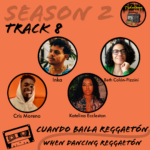 Season 2 Track 8: Cuando Baila Reggaetón / When Dancing Reggaeton
Season 2 Track 8: Cuando Baila Reggaetón / When Dancing Reggaeton
In this episode nos dedicamos a perrear. We visit the roots and development of reggaetón, learning about the economically disadvantaged, Caribbean Afro-descendant youth who rebelled the rhythm into existence. We also learn about the musical elements of the rhythms and about the dance of reggaetón, touching briefly on reggaetón’s relation to Dembow.
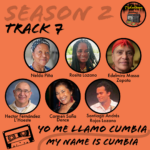 Season 2 Track 7: Yo Me Llamo Cumbia / My Name is Cumbia
Season 2 Track 7: Yo Me Llamo Cumbia / My Name is Cumbia
In this episode we visit host Andrés’ beloved motherland, Colombia, to talk about Cumbia! This rhythm has expanded to many countries and its diffusion his so widespread that cumbia enthusiasts are sometimes unaware of where the rhythm is from and which cultures created it. We explore the Black and Amerindian roots of cumbia, how it’s danced, its original instruments, and its relation with the bullerengue rhythm, as well as cumbia’s whitening and expansion outside of Colombia.
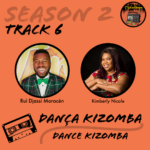 Season 2 Track 6: Dança Kizomba / Dance Kizomba
Season 2 Track 6: Dança Kizomba / Dance Kizomba
We take a trip across the ocean, away from the Americas all the way to Africa to discuss a popular rhythm in our dance scene – Kizomba! Our guests Rui Djassi Moracén and Kimberly Nicole help us dig in to the history of Kizomba and the socio-political and cultural context within Angola where it developed. We also discuss Kizomba’s musical influences, how the dance came to be, and the rhythm’s international reach.
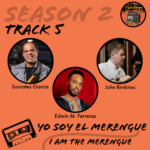 Season 2 Track 5: Yo Soy El Merengue / I Am The Merengue
Season 2 Track 5: Yo Soy El Merengue / I Am The Merengue
In this episode we talk about the origins and history of merengue, its role as the national rhythm of the Dominican Republic under dictator Rafael Trujillo, and its diffusion all over the Latin American and Latino markets in the U.S. including its mixtures with Hip Hop. Of course, since we’re dancers, we also explore how the Black roots of merengue informed how the rhythm is danced.
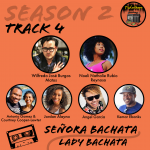 Season 2 Track 4: Señora Bachata / Lady Bachata
Season 2 Track 4: Señora Bachata / Lady Bachata
We talk about the development of the rhythm and its musical influences as well as the political and social events that marked its evolution. We also talk about bachata dance and about the role of sensual bachata on the diffusion of traditional Dominican bachata. We close the episode with reflections from local bachater@s regarding the lack of explicit race-driven discussions on the contributions of black people to the rhythm of bachata.
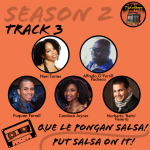 Season 2 Track 3: Que Le Pongan Salsa! / Put Salsa On It!
Season 2 Track 3: Que Le Pongan Salsa! / Put Salsa On It!
We explore our favorite blend of Afro-Latin rhythms: Salsa! Our exploration includes a historical contextualization of the development of salsa, highlighting the role of Afro-Cubans and Afro-Latin@s broadly as well as the rhythmical richness inherited from Africa. Our guests provide a description of the introduction and diffusion of salsa in the United States and discuss the need to recenter Blackness and the role that dancers in the Afro-Latin dance scene play in the preservation of the roots of this beloved blend we call salsa.
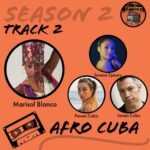 Season 2 Track 2: Afro Cuba
Season 2 Track 2: Afro Cuba
We explore Afro-Cuban rhythms. From basic historical events that played an important role in their development and popularity, to the connection between the dances and the religious practices they often derive from, to the ways in which dancers are encouraged to approach these folkloric gems centering blackness and the contributions of Afro-Cubans. Our guests are Afro-Cuban folklore expert, choreographer and dancer Marisol Blanco, and choreographers and practitioners Serena Spears and James and Peiwei Cobo.
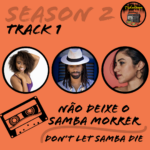 Season 2 Track 1: Não Deixe o Samba Morrer / Don’t Let Samba Die
Season 2 Track 1: Não Deixe o Samba Morrer / Don’t Let Samba Die
In the words of our guest Pablo Guerreiro, samba is a connection between heaven, earth and humans, it’s a movement, it’s what transforms, what makes everything. We explore historical events that played an important role in the development of samba, consolidating it as a symbol of Brazilian identity. We also talk to samba dancers Charis Railey and Adriana Blanco about their experience with this Afro-Brazilian rhythm.